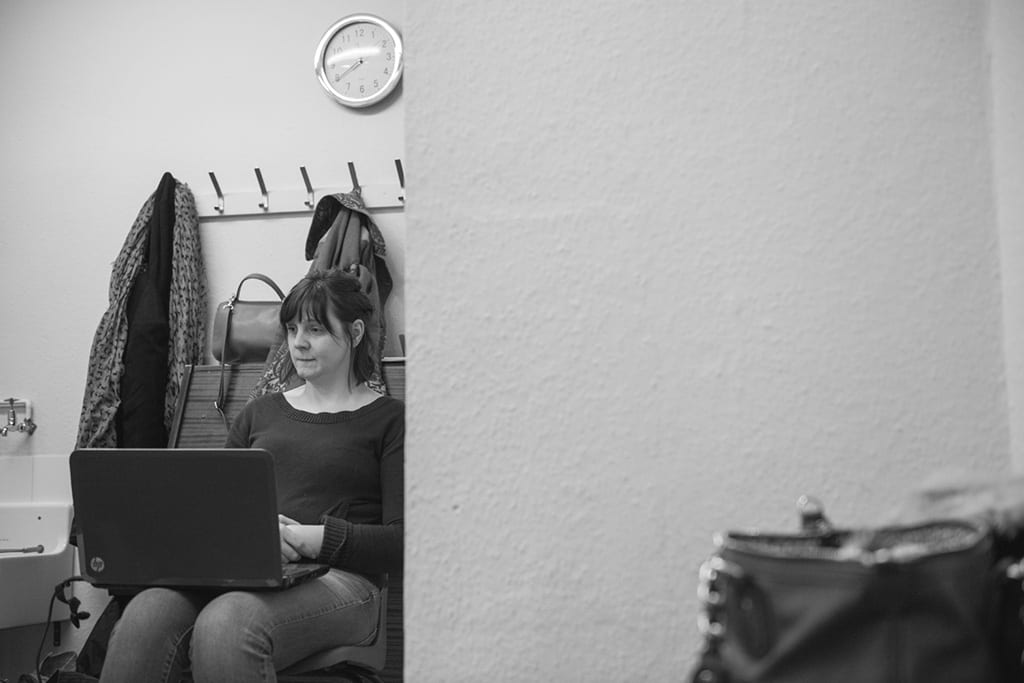KH: What is it about Ghost Town that had to be written?
JF: The platonic friendship between Megan and Joe. Joe has Obsessive Compulsive Disorder (OCD) which is a massive thing for him – but fundamentally it’s about friendship and how important platonic relationships are – especially for teenagers. We explored the possibility of non-platonic elements during the R&D – maybe one of them had a crush on the other or something – but nothing came through into the final text and I’m happy to leave it like that.
KH: What was the effect of having Katie Posner and Richard Hurford working with you?
JF: Winning the Generation Z competition gave me writer Richard Hurford as mentor for this piece. I have enormous respect for him as a writer, and we have a similar approach and like similar things. He provided a lot of draft-reading and comments – but also informal moral support and answers to the kinds of questions I didn’t know I’d come up against – a function of this being my first professional production.
Katie works a lot with new writers and is an excellent dramaturg and could give feedback on what does/doesn’t work. Luckily most of the sections she questioned, I’d already had doubts over so it was a case of addressing those details in a subsequent draft. She’s had a very strong vision of what she wanted to do with this piece right from the beginning, so during the original R&D 18 months ago I could concentrate entirely on the writing.
It has been an eye-opener the number of rewrites I’ve done. Chipping away by degrees. By the time we reached the second R&D with the actors who are performing these roles I had a pretty solid draft but it still gave free rein for actors to ask difficult questions – so we were able to probe into a characters’ history. It was after this point I decided to introduce scenes with flashbacks into particular memories. Previous drafts alluded to these memories before, but didn’t present them as we do now.
KH: What drives you to write drama?
JF: I’ve toyed with short stories, but drama is my love. I like writing dialogue best. I love the collaborative nature of theatre and the fact the script is just the blueprint for the next stage of the process. It’s fabulous that so many people join in creating a collective outcome. I also love to experience the audience’s response. My background was a degree in English and I lost confidence while at university when I discovered I have OCD – just coping with the condition was tough enough. It was afterwards through working with youth theatres as a practitioner and director that I got it back.
KH: Ghost Town is set by the sea – you have talked about sea as a metaphor for the mind – but what about the beach next to it? What does that space mean for you?
JF: I’m interested in the sea-side/edge primarily as a kind of wilderness, some uninhabited space. Joe has run away – terrified he has killed someone – so he has to be away from everyone in literal sense but in his mind too. Because he’s isolated from normal life that gives space for his thoughts – represented by the third character Keira – to be present in the same space. This is not a sitting room drama, not realistic. It’s representative, and the space by the sea allows for that non-naturalistic element.
KH: Have you been involved in production decisions – like the casting, sound score and set?
JF: All production decisions have been Katie’s. She’s always had a very clear vision. I was involved in auditions which was brilliant, to observe the process and be able to comment.
KH: You used to work in the education department at York – is outreach/young people your particular focus?
JF: Yes! I want to write plays that people want to come and see and make them curious about the world. I would love to bring new people to the theatre that haven’t come before. Ghost Town is aimed at a youngish audience with adult interest too. The creative process is just the same writing for young people as for adults. Teenagers are a very exacting audience and deserve complexity and challenge. If the audience is much younger the language might be different. However, young people deserve the very best of plays.
KH: What is your aspiration for this tour – what do you hope audiences/venues will get out of this production?
JF: For me – thrilled that it’s touring! Being able to test it in different locations will give a range of audience feedback. For the play, it is quite a dark play: thought provoking. Characters are intriguing so gives people lots to think about. It’s deliberately not easy to understand everything straight away – I want people to get an emotional connection and go away and think about it, and I hope that they get excited about what theatre can be.
KH: Next plans for Jessica Fisher?
JF: Still developing Paradise a play that won Nick Darke award 2010 with director Dick Bonham in Leeds. It is also a play for younger audiences about a lad called Connor whose mum has died, he lives with his granddad in a concrete jungle estate and he becomes a guerrilla gardener. His mission is to turn the estate into a paradise. We’re in R&D in late spring and then we hope to get funding to produce it – cast of four.
I’ve moved to London last Autumn and have managed to give up a full-time job: I now work 3 days a week as a cheesemonger! I meet loads of people, and it’s a complete contrast to my writing.
Ghost Town, will be presented at the York Theatre Royal, from 12th to 19th February 2014.

